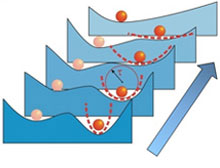Early Warning of Climate Tipping Points
Recent work shows that early warning of an approaching climate tipping point is possible in principle, and could have considerable value in reducing the risk that they pose.
Early warning can take several forms, ranging from the knowledge that an event could occur, through qualitative assessment that it is becoming more likely, to a forecast of its timing. Recently, there has been growing interest in generic early warning signals for critical transitions in complex systems, especially slowing down as a bifurcation is approached. In general, as a system approaches a bifurcation point where its current state becomes unstable, and switches to some other state, one can expect it to become more sluggish in response to small perturbations. This phenomenon - termed 'critical slowing down' in dynamical systems theory - is widely known, but has only now been applied to climate dynamics.
Slowing down has been found in climate-model output and palaeoclimate data approaching abrupt transitions. This suggests probabilistic forecasting of some conceivable future climate tipping points may be feasible, especially if such statistical early warning indicators can be combined with dynamical modelling.
More about this research and its application to paleo-climate and observational data can be found in Nature Climate Change 1, 201-209. See also the paper 'Climate bifurcation during the last deglaciation?' in Climate of the Past 8, 1127-1139(2012).

Schematic representation of a system being forced past a bifurcation point.
Lenton et al. (2008) PNAS
105(6): 1786-1793
Many people assume that tipping points which could be passed as a result of human-induced climate change are essentially unpredictable. Recent research shows that the situation is not as hopeless as it may seem: we have the tools to anticipate thresholds, which means we could give societies valuable time to adapt. Although these findings give us hope, we are still a long way from developing rigorous early warning systems for these climate hazards.
Professor Tim Lenton
